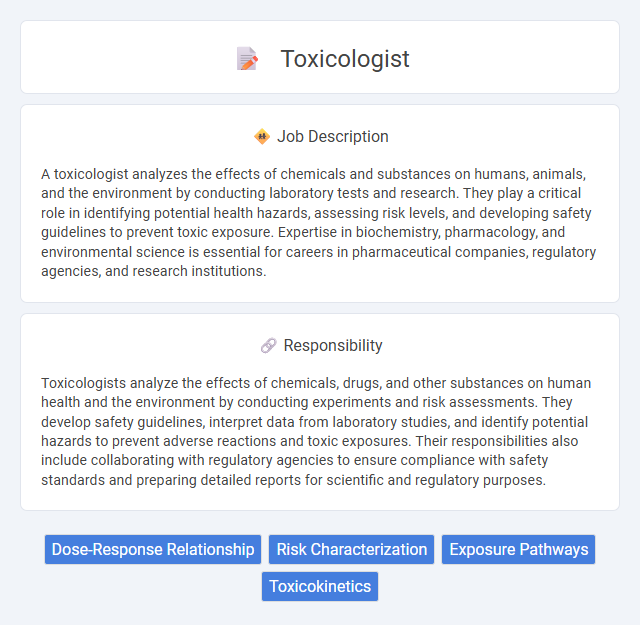
A toxicologist analyzes the effects of chemicals and substances on humans, animals, and the environment by conducting laboratory tests and research. They play a critical role in identifying potential health hazards, assessing risk levels, and developing safety guidelines to prevent toxic exposure. Expertise in biochemistry, pharmacology, and environmental science is essential for careers in pharmaceutical companies, regulatory agencies, and research institutions.
People with strong analytical skills and a keen interest in biology and chemistry are likely suitable for a toxicologist career, as it involves studying the effects of chemicals on living organisms. Those who can handle detailed laboratory work and have the patience to conduct long-term research may find this profession fitting. Individuals uncomfortable with exposure to potentially hazardous substances or lacking attention to safety protocols might be less suited for this role.
Qualification
A qualified toxicologist typically holds at least a bachelor's degree in toxicology, chemistry, biology, or a related field, with many positions requiring a master's degree or Ph.D. Specialized knowledge in areas such as pharmacology, biochemistry, and regulatory requirements is essential for analyzing the effects of chemicals on living organisms. Proficiency in laboratory techniques, data interpretation, and risk assessment supports roles in pharmaceuticals, environmental science, and public health.
Responsibility
Toxicologists analyze the effects of chemicals, drugs, and other substances on human health and the environment by conducting experiments and risk assessments. They develop safety guidelines, interpret data from laboratory studies, and identify potential hazards to prevent adverse reactions and toxic exposures. Their responsibilities also include collaborating with regulatory agencies to ensure compliance with safety standards and preparing detailed reports for scientific and regulatory purposes.
Benefit
A career as a toxicologist likely offers significant benefits, including the opportunity to contribute to public health by identifying harmful substances and ensuring safety standards. The job may provide competitive salaries and job stability due to ongoing demand in industries like pharmaceuticals, environmental science, and regulatory agencies. Professionals in this field could also experience intellectual fulfillment through research and problem-solving, making the role both rewarding and impactful.
Challenge
A toxicologist likely faces the challenge of accurately assessing the harmful effects of chemicals on living organisms in complex and variable environments. They probably need to stay updated with rapidly evolving scientific research and regulatory standards to ensure safety assessments are reliable. The role may require strong analytical skills to interpret data amidst uncertainty and potential risks.
Career Advancement
Toxicologists can advance their careers by gaining specialized expertise in areas such as forensic toxicology, environmental toxicology, or pharmaceutical toxicology, increasing their value to employers. Pursuing advanced degrees like a master's or PhD and obtaining professional certifications such as the American Board of Toxicology (ABT) certification enhances credibility and opens opportunities for leadership roles. Experience in regulatory affairs and risk assessment also positions toxicologists for senior scientist, project manager, or academic faculty careers.
Key Terms
Dose-Response Relationship
Toxicologists specialize in analyzing the dose-response relationship to determine how varying exposure levels to chemicals or substances impact biological systems. This relationship is crucial for assessing risk thresholds, establishing safety guidelines, and predicting toxic effects in humans and wildlife. Accurate dose-response data guides regulatory decisions and the development of pharmacological therapeutics.
Risk Characterization
Risk characterization in toxicology involves evaluating the potential adverse health effects of chemical exposures by integrating hazard identification and dose-response assessments. Toxicologists analyze exposure scenarios and population vulnerabilities to estimate risk levels, informing regulatory decisions and safety standards. This process is critical for preventing toxic exposures and protecting public health through science-based risk management.
Exposure Pathways
Toxicologists analyze exposure pathways to understand how chemicals enter the body through inhalation, ingestion, or dermal absorption, assessing the potential health risks associated with each route. Detailed evaluation of environmental, occupational, and accidental exposure scenarios helps identify the factors influencing toxicity and dose-response relationships. This knowledge guides risk assessment, regulatory decisions, and the development of safety protocols to minimize harmful exposures.
Toxicokinetics
Toxicologists specializing in toxicokinetics analyze the absorption, distribution, metabolism, and excretion (ADME) of toxic substances within biological systems to assess potential health risks. They utilize advanced modeling techniques and in vitro or in vivo studies to determine exposure levels, biotransformation processes, and elimination rates critical for risk assessment and regulatory compliance. Expertise in toxicokinetics supports the development of safer chemicals, pharmaceuticals, and environmental guidelines by predicting toxic effects and dose-response relationships.
 kuljobs.com
kuljobs.com